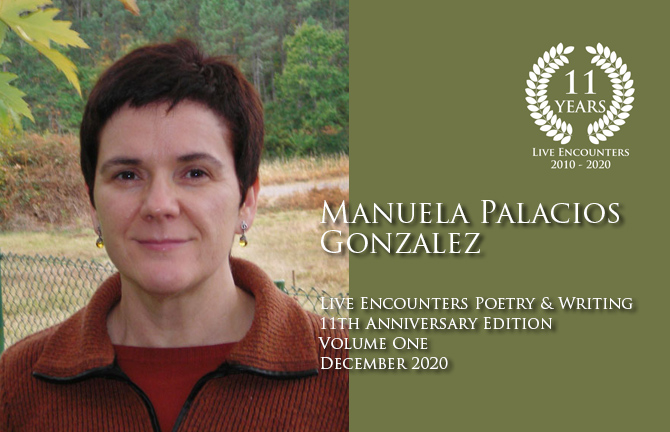
Live Encounters Poetry & Writing, Volume One, December 2020.
Manuela Palacios lectures on Anglophone literature at the University of Santiago de Compostela (Galicia, Spain). She has edited, translated and written about Irish, Galician and Arabic poetry. Among the anthologies she has edited are – To the Winds Our Sails. Irish Writers Translate Galician Poetry, co-edited with the Irish writer Mary O’Donnell (Salmon Poetry 2010), Forked Tongues. Galician, Basque and Catalan Women’s Poetry in Translations by Irish Writers, Six Galician Poets (Arc Publications 2016, Migrant Shores: Irish, Moroccan & Galician Poetry (Salmon 2017) and Ανθολογία Νέων Γαλικιανών Ποιητών – Antoloxía De Poesía Galega Nova (Vakxikon 2019). Manuela’s research on women’s studies, ecopoetry and the human-animal trope has, in recent times, set her on the stimulating path to creative writing (http://irgal.es/).
Tetouan
A maze of streets,
decisions and indecisions,
astray and found,
while odonyms conjure up
children playing in a Galician
military town.
The colonial nightmare
Plaza Primo, General Varela, Ensanche…
Today, a remote memory, perhaps
a deeply buried grievance, maybe
while the city spreads its white dove wings.
Marrakesh
A glacial gust —
The Atlas girds the city with snow —
In a nineteenth-century photograph
the ochre ramparts cuddle
evergreen palm fronds ‒ the vast plain
fringed by the white-crowned range.
The frost subdued by roseate walls.
Dust, a harbinger of the encroaching desert.
Essaouira
Amina gets ready for a corner kick while
Mourad complains the ball never crossed
the line
Aicha, the goalie, shouts instructions
at her team’s defenders and
Mohammed gives his attackers the signal to
RUN!
Boys and girls in their teens
covered or unveiled
soccer their common goal
on the Essaouira sands.
Asilah
Silis ‒ Arzila ‒ Asilah
lost and regained
time after time.
Through centuries, a craftsman
crouching in a dark gateway
illuminates pottery with vibrant pigments,
colour flowing now in a deluge over
walls, doors and windows with
cobalt, saffron, henna and mint.
Buttressed town of past daredevil
exploits now coquettish and welcoming
us, who stand by the Sidi Mansour dome
facing our shared ocean.
Taroudant
We quench our thirst with papaya juice
from Ali’s walled garden ‒
Asma’s congenial nest.
Fresh sap in our veins, the affable host
expounds on the medina’s wonders and woes,
guiding our steps.
Grandmother town of shed royal blood
you cherish the virtues of the caravansary ‒
robust, spacious, all-embracing site
of solace for the adventurous traveller.
Fes
As the story goes,
they were the daughters of a prosperous merchant
‒Fatima and Maryam‒
from ninth-century Kairouan.
The imbroglios of history led the family to Fes where,
learned and enterprising,
each sister founded a mosque ‒
Al-Qarawiyyin and Al-Andalusiyyin ‒
memorials of Arab inflow in Morocco.
As the story goes,
Fatima would only use the property’s
land to get the necessary sand, plaster and stone
for her mosque.
As the story goes,
Al-Qarawiyyin would soon become
a madrasa and, then, the first university in the world
hosting a bounty of librarians’ treasures.
Why should I want to dispute a story about
two wise, resourceful and honoured women?
© Manuela Palacios

